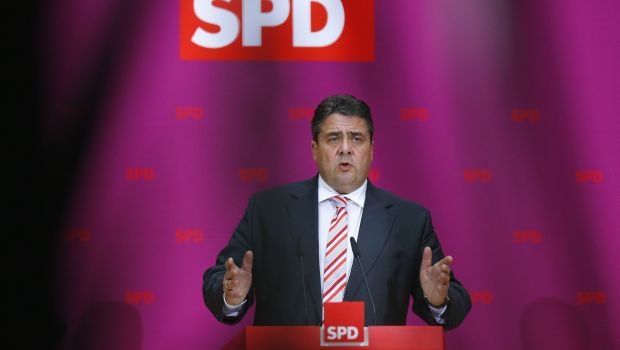
Leader of German Social Democratic party (SPD) Sigmar Gabriel addresses the media after a party meeting in Berlin October 20, 2013 (REUTERS/Tobias Schwarz)
Discussions between Merkel and the centre-left SPD on forming a new government can now begin on Wednesday, a month after an election saw her conservatives emerge as the biggest political force but needing a partner to form a majority.
The SPD’s willingness to enter talks comes at a price. The party listed 10 demands it called “non-negotiable”, including a minimum wage of EUR 8.50 per hour, equal pay for men and women, greater investment in infrastructure and education, and a common strategy to boost euro zone growth.
“We will negotiate hard so that in the end a workable government emerges. Compromises will be necessary. However the party considers the following points non-negotiable,” the SPD declaration said, listing a minimum wage in first place.
Merkel’s Christian Democrats (CDU) and their Bavarian allies the Christian Social Union (CSU), however, favor “wage floors” on a regional or sectoral basis, set by employers and unions.
The SPD also demanded equal pensions in the former West and East Germany, the ability to have dual citizenship, and measures to make it easier to combine work with family life.
Of the 229 senior SPD members to vote, 196 supported the talks, 31 objected and 2 abstained.
“We aim to form a government by Christmas. That should be enough time,” SPD Chairman Sigmar Gabriel told reporters.
The parties must now thrash out policies and a cabinet line-up. The influential post of finance minister, now held by the CDU’s Wolfgang Schaeuble, is one prize. SPD members have refused to say publicly which posts they want, but media reports say they may seek at least six portfolios in the 15-member cabinet.
German voters, international investors and Berlin’s European allies have mostly been expecting a “grand coalition” between the CDU/CSU and SPD, and few expect any partnership deal to greatly alter Merkel’s domestic and foreign policy agenda.
No mention is made in the SPD document of tax increases for the wealthiest, for which the SPD had campaigned during September’s election but which the chancellor has ruled out.
The SPD is anxious to avoid a rerun of its 2005-2009 coalition with Merkel, from which it emerged with its worst election result since World War Two.
A group of disgruntled SPD members protested outside the party’s Berlin headquarters during Sunday’s meeting.
A grand coalition would enjoy an overwhelming majority in the Bundestag, the lower house of parliament, and find it easier to push legislation through the Bundesrat, the upper house where the governments of Germany’s 16 federal states are represented.
Such a union began to appear all but inevitable after Merkel’s exploratory talks with the environmentalist Greens broke down last week, strengthening the SPD’s hand.
Erwin Sellering, the SPD state premier of Mecklenburg-Vorpommern, sought to keep up the pressure on Merkel in an interview with Welt am Sonntag newspaper on Sunday, saying: “If we are not able to push through enough of what we have pledged, then we must say to voters: ‘sorry but we are not available’… fresh elections are nothing alarming for us.”
A new poll out on Sunday showed the party slipping a point from its election result to 25 percent, while Merkel’s conservatives held firm at 42 percent.
The SPD will seek final approval of any coalition pact in a poll of its some 472,00 grassroots members.
